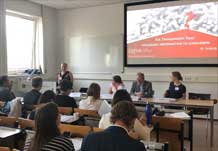
The conference was opened by Prof. Luzak who introduced the attendees to the dilemmas related to the use of the principle of transparency in consumer law
Prof Luzak convenes 'The Transparent Trap: Disclosing Information to Consumers' conference in Amsterdam
Prof. McFarlane (UCL) once said: "Law is difficult - it's meant to be difficult'. The speakers and attendees at 'The Transparent Trap: Disclosing Information to Consumers' conference, held on 4-5 July 2019 at the University of Amsterdam, disagree with this statement and spent a day and a half discussing how policymakers but also private actors could simplify the information design.
The conference was opened by Prof. Luzak who introduced the attendees to the dilemmas related to the use of the principle of transparency in consumer law. The audience was encouraged to engage with such fundamental questions as whether we can talk about an overarching principle of transparency in EU (consumer) law or whether we should change the discussion framework to consider only the traders' and service providers' duty to provide transparent information. Further point of discussion related to the need to use a complex transparency toolbox, consisting of varied requirements, whose link to one another remains mysterious. Moreover, it was inquired whether we should require transparency of just form or also of content of disclosures and how this could be achieved.
Throughout the conference these where the main questions that have been addressed by various excellent speakers, discussing transparency issues from multidisciplinary perspectives. Prof. John Bateman (University of Bremen) focused on the analysis of the role of multimodiality, using various examples from the linguistics science to further illuminate the difficulties of achieving transparency. Dr Sophie Boerman (University of Amsterdam) presented evidence from her empirical research on hidden forms of advertising on social media, again illustrating the lack of transparency in everyday consumer lives. Prof Helena Haapio (University of Vaasa) and Rob Waller (Simplification Centre) offered suggestions how traders' and service providers' could increase their disclosure transparency. Their work with design patterns of disclosures and legal practitioners clearly indicates that a lot can be achieved in practice to improve disclosure transparency.
The general role of the principle of transparency in EU law has been discussed by prof. Paivi Leino-Sandberg (University of Helsinki), who argued for the change of perception of legislative transparency in the EU, how it shifted from representative to participatory democracy. Prof. Peter Rott (University of Kassel) discussed transparency in unfair contract terms law, where the EU legislator seems to require that consumers are made to understand economic consequences of concluded transactions, which is often beyond their abilities. And prof. Vanessa Mak (University of Tilburg) introduced an important topic of whether we can expect transparency in online transactions where third-party traders are involved, in the new forms of platform economy.
Prof. Marco Loos (University of Amsterdam), Mia Junuzović (University of Amsterdam), prof. Alexander J. Wulf (SRH Berlin) and dr Ognyan Seizov (SRH Berlin) presented preliminary findings from the research project 'The ABC of Online Disclosure Duties: Towards a More Uniform Assessment of the Transparency of Consumer Information in Europe', led by prof. Joasia Luzak. For example, Mia demonstrating the lack of consistency of the European legislator in drafting transparency requirements, which causes confusion and further muddles transparency of EU consumer rules for national authorities as well as private actors. Marco's presentation concerned very important issue of lack of literacy amongst consumers, as well as how it should impact the level of transparency required from disclosures to them. Alexander & Ognyan introduced the audience to the results of the empirical qualitative study conducted within the project, where national enforcement authorities were asked to assess how and whether transparency requirements work in practice.
This conference has been sponsored by the Dutch and German Science Academies (NWO and DFG) within the framework of this research project.
Date: 30 September 2019
